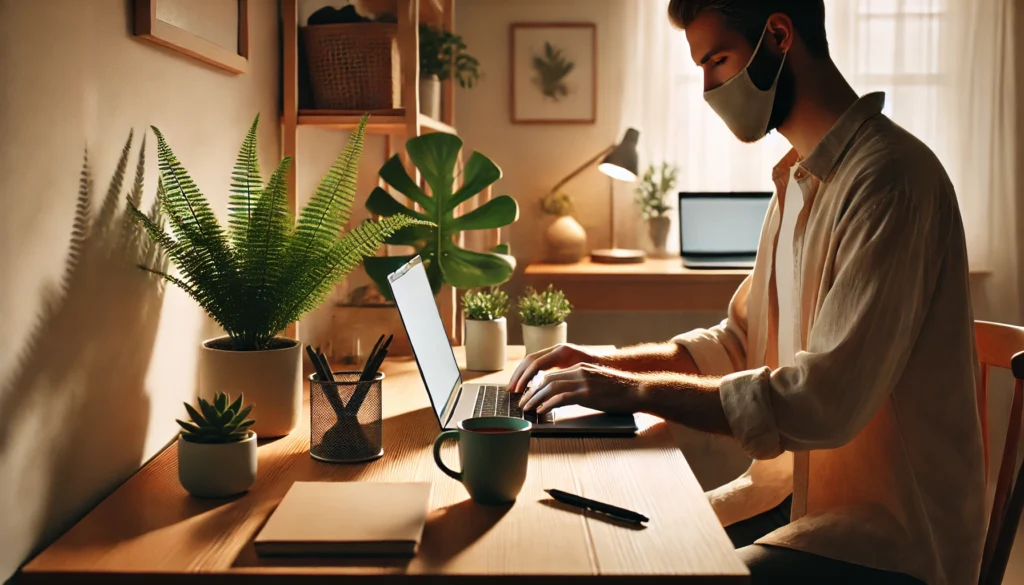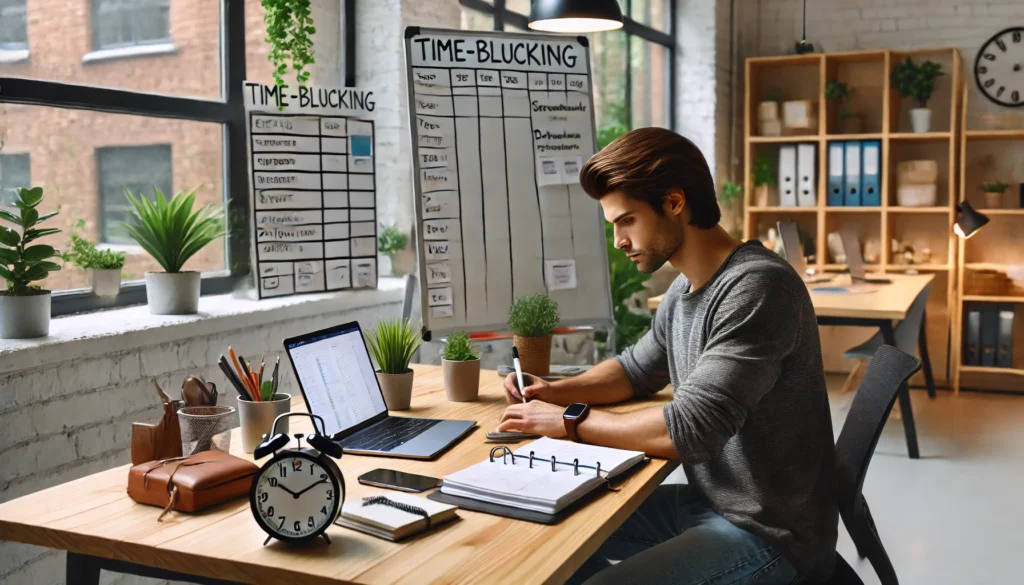Distraction, at its core, is anything that diverts your attention away from your current task. It’s a universal challenge that affects professionals across various fields. To effectively master focus, it’s crucial to understand the root causes of distraction.
You may also like: Overcoming Distractions: Focus at Work
The Science of Distraction
Distraction can be attributed to both external and internal factors. External distractions include noise, social media notifications, and interruptions by colleagues. Internally, our minds may wander due to stress, fatigue, or even boredom. Neuroscientific research suggests that the brain’s prefrontal cortex, responsible for decision-making and attention, plays a key role in managing distractions.
Understanding the chemistry of distraction involves recognizing how dopamine, a neurotransmitter associated with pleasure and reward, influences our attention span. When we receive notifications, for instance, dopamine is released, creating a cycle of distraction that can be challenging to break. Furthermore, studies have shown that multitasking, often glorified in modern work culture, can actually lead to increased distraction and decreased productivity.
Types of Distractions
Distractions can be categorized into several types: sensory, emotional, and cognitive. Sensory distractions, such as loud noises or bright lights, directly interfere with our perception. Emotional distractions arise from personal feelings or stressors, diverting our mental resources. Cognitive distractions occur when our thoughts drift away from the task at hand, often due to overthinking or lack of interest. Identifying the type of distraction you are most susceptible to can help in devising targeted strategies to combat it.
The Impact of Distraction
The impact of distraction on productivity and mental health can be profound. Chronic distraction can lead to decreased work quality, prolonged task completion times, and increased stress levels. In the long term, this can contribute to burnout and mental fatigue. Moreover, constant distraction can impair memory formation and reduce the brain’s ability to process information efficiently. Recognizing these impacts is the first step in understanding the importance of mastering focus.
Techniques to Control Distraction
Eliminate External Distractions
One of the most straightforward ways to control external distractions is by creating a conducive environment for concentration. This might involve using noise-canceling headphones, setting up a dedicated workspace, or utilizing apps designed to block distracting websites and notifications.
Creating a distraction-free zone in your work environment is crucial. This can be achieved by organizing your workspace to minimize clutter, which can be a visual distraction. Additionally, consider implementing a ‘digital detox‘ where you limit your exposure to digital devices during work hours.
Incorporating soundscapes or white noise can also help mask disruptive noises. Studies have shown that certain types of sound, such as nature sounds or white noise, can enhance focus by providing a consistent auditory backdrop, reducing the impact of sudden noises.
Manage Internal Distractions
Internal distractions require a more introspective approach. Techniques such as mindfulness meditation can enhance awareness and focus, allowing you to gently bring your attention back to the task at hand whenever your mind begins to wander.
Practicing mindfulness involves being present in the moment and acknowledging your thoughts without judgment. This practice can strengthen your ability to refocus after a distraction. Additionally, regular meditation can increase gray matter in the brain, which is associated with improved focus and emotional regulation.
Addressing internal distractions also involves managing stress and fatigue. Techniques such as deep breathing exercises, progressive muscle relaxation, and maintaining a balanced diet can contribute to a calmer and more focused mindset.
Harnessing the Power of Habits
Developing positive habits can significantly reduce the impact of distractions. Habits such as starting your day with a focused task, setting clear daily goals, and reviewing your accomplishments at the end of the day can build a strong foundation for sustained focus. Over time, these habits become second nature, reducing the effort required to maintain concentration.

Tips on How to Avoid Distractions and Stay Focused
Develop a Routine
A well-structured routine can significantly minimize distractions. By allocating specific times for tasks and breaks, you create a predictable pattern that conditions your mind to focus during work periods. The Pomodoro Technique, which involves working for 25 minutes and then taking a 5-minute break, is a popular method that can boost concentration.
Establishing a morning routine that includes activities such as exercise, meditation, or journaling can set a positive tone for the day. These activities help clear mental clutter and prepare your mind for focused work.
Creating an end-of-day routine is equally important. This can involve reviewing your tasks, planning for the next day, and engaging in relaxing activities to signal the end of the workday, helping your mind transition from work mode to rest mode.
Prioritize Tasks
Prioritization is key to maintaining focus. Start by identifying the most critical tasks and tackle them first when your energy levels are at their peak. This approach not only enhances productivity but also minimizes the temptation to procrastinate.
Utilizing tools like the Eisenhower Box can assist in categorizing tasks based on urgency and importance, helping you focus on what truly matters. Prioritization also involves setting realistic goals, breaking larger tasks into smaller, manageable steps, and rewarding yourself upon completion to maintain motivation.
Time blocking is another effective strategy. Allocate specific time slots for each task on your calendar and stick to these commitments. This practice reduces decision fatigue and ensures that your most important tasks receive the attention they deserve.
Foster a Growth Mindset
Adopting a growth mindset can greatly enhance your ability to stay focused. A growth mindset, as opposed to a fixed mindset, involves seeing challenges as opportunities for learning and development. This perspective encourages persistence in the face of distractions and setbacks. Embrace mistakes as part of the learning process and use them to refine your focus strategies.
Blocking Out Distractions at Work
Use Technology Wisely
While technology can be a source of distraction, it can also be a tool to enhance focus. Utilize apps and software that promote productivity, such as calendar applications for scheduling, project management tools to track progress, and browser extensions that block distracting websites.
Leveraging technology to automate repetitive tasks can free up mental space for more critical work. Tools like task managers and virtual assistants can help streamline your workflow and reduce the cognitive load associated with managing multiple responsibilities.
Implementing a digital detox during work hours can also be beneficial. Set specific times to check emails and notifications, reducing the constant pull of digital distractions. Consider using airplane mode on your phone during critical work periods to minimize interruptions.
Set Boundaries
Establishing clear boundaries with colleagues, friends, and family can help you maintain focus during work hours. Communicate your working hours and let them know when you are available for interruptions. This practice fosters respect for your time and concentration.
Creating a ‘do not disturb’ signal, such as a closed door or a sign on your desk, can visually communicate your need for uninterrupted work time. Additionally, setting boundaries involves learning to say no to non-essential tasks and requests that can detract from your focus.
Encourage a culture of respect for focused work within your team or organization. This can involve setting shared quiet hours or implementing meeting-free days to allow for uninterrupted work periods.
Create a Supportive Work Culture
Fostering a work environment that values focus and concentration can enhance productivity for everyone involved. Encourage open discussions about distractions and share strategies that have worked for you. Support each other in setting and maintaining boundaries, and celebrate collective achievements to reinforce the importance of focused work.

Dealing with Digital Distractions
Limit Social Media Usage
Social media platforms are designed to capture your attention. To mitigate this, consider setting specific times for social media use or employing apps that restrict access during work hours. This can significantly reduce the temptation to check notifications frequently.
Engaging in a social media detox can help break the habit of constant scrolling. Consider taking periodic breaks from social media to reset your relationship with these platforms. During these breaks, focus on activities that bring you joy and relaxation, reinforcing the benefits of reduced screen time.
Reflect on your social media usage and identify patterns that lead to distraction. Are there certain triggers or times of day when you’re more likely to engage in mindless scrolling? Use this awareness to develop strategies to counteract these habits, such as placing your phone out of reach during work periods.
Practice Digital Minimalism
Digital minimalism involves decluttering your digital life to focus on what truly matters. This might mean unsubscribing from unnecessary email lists, deleting unused apps, and organizing digital files. By simplifying your digital environment, you reduce mental clutter and enhance focus.
Regularly audit your digital devices and remove any apps or subscriptions that no longer serve a purpose. This practice not only reduces distraction but also improves the performance of your devices.
Organizing your digital workspace can also boost productivity. Create a system for managing files and emails, ensuring that you can easily find what you need without unnecessary searching. Consider using cloud-based storage solutions to streamline access to important documents.
Cultivate Mindful Technology Use
Being mindful about how you use technology can help mitigate its potential to distract. Before reaching for your phone or opening a new browser tab, pause and consider your intention. Are you engaging with technology to fulfill a specific need, or is it a habitual distraction? Cultivating this awareness can help you make more intentional choices about technology use, enhancing your ability to stay focused.
Practical Strategies to Minimize Distractions
Optimize Your Environment
Your physical environment has a profound impact on your ability to concentrate. Ensure your workspace is organized, free from clutter, and tailored to your personal preferences. For some, this may mean incorporating elements like plants, natural lighting, or ergonomic furniture.
Experiment with different elements to find what enhances your focus. Some people thrive in minimalist environments, while others find inspiration in creative, personalized spaces. Adjust your workspace regularly to keep it fresh and conducive to concentration.
Consider the role of color and lighting in your environment. Soft, natural lighting can reduce eye strain and improve mood, while certain colors, like blue and green, are known to promote focus and calmness. Experiment with these elements to create an environment that supports your work.
Leverage the Power of Breaks
Regular breaks are essential for maintaining focus over extended periods. Engage in activities that refresh your mind, such as taking a walk, stretching, or listening to music. Breaks prevent burnout and help sustain attention throughout the day.
Incorporate movement into your breaks to enhance circulation and increase energy levels. Simple exercises, like a quick walk or desk stretches, can rejuvenate both body and mind.
Mindful breaks, where you focus on your breath or engage in a brief meditation, can reset your mental state and improve focus upon returning to work. Plan your breaks strategically, using them as an opportunity to recharge before tackling challenging tasks.
Experiment with Focus Techniques
Different techniques work for different individuals, so it’s essential to experiment and find what suits you best. Techniques like the Pomodoro Technique, time blocking, or the use of focus playlists can provide structure and motivation. Regularly assess your strategies and be open to trying new methods to keep your focus sharp.

Conclusion: The Path to Concentration Mastery
Mastering focus is a journey that requires commitment and practice. By understanding the science of distraction and implementing practical strategies, you can significantly enhance your concentration and productivity. Whether you’re striving to improve mental sharpness, optimize your work environment, or simply seek to block out distractions, these tips provide a comprehensive approach to achieving your focus goals.
Incorporate these techniques into your daily routine, and you’ll find yourself better equipped to handle the challenges of maintaining concentration in a world full of distractions. Remember, the key to mastering focus lies in consistent practice and a willingness to adapt strategies to fit your unique needs and circumstances.
By embracing these insights, you not only enhance your own productivity but also set an example for others seeking to navigate the complexities of modern life with clarity and focus. The path to concentration mastery is a rewarding one, filled with opportunities for personal growth and enhanced performance.
Further Reading:
7 ways to avoid distractions and stay focused on studying
How to Stop Getting Distracted While You Work
An Addict’s Guide to Overcoming the Distraction Habit
Important Note: The information contained in this article is for general informational purposes only, and should not be construed as health or medical advice, nor is it intended to diagnose, prevent, treat, or cure any disease or health condition. Before embarking on any diet, fitness regimen, or program of nutritional supplementation, it is advisable to consult your healthcare professional in order to determine its safety and probable efficacy in terms of your individual state of health.
Regarding Nutritional Supplements Or Other Non-Prescription Health Products: If any nutritional supplements or other non-prescription health products are mentioned in the foregoing article, any claims or statements made about them have not been evaluated by the U.S. Food and Drug Administration, and such nutritional supplements or other health products are not intended to diagnose, treat, cure, or prevent any disease.


